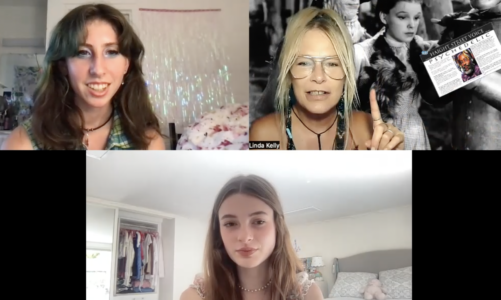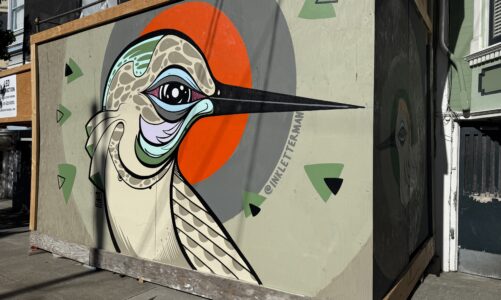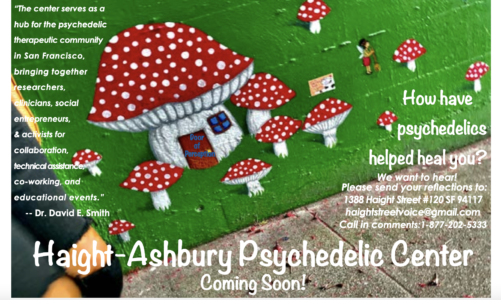We’re over the moon to announce the Haight Ashbury Psychedelic Center column where we will share the latest news, legal developments, personal stories, educational links, and more about all-things psychedelic. Dr. David E. Smith is the man behind the curtain, so we thought we’d share snippets from a recent conversation with this beloved man, founder of the Haight-Ashbury Free Clinic just months after the Human Be-In.
HSV: How old were you at the Human Be-In?
DS: 27. I was up at UCSF medical school conducting research in animal models and human experiences with a variety of psychedelics, and reading about the burgeoning psychedelic culture.
Our goal for the HAPC is to learn from the past: What went wrong, how to do it right, how to get it above ground. Be careful — this is a sacred experience for enlightenment. The crowd manifestation at places like Burning Man, the celebrations and dancing and music, it’s amazing the number of people that go to Burning Man. I’m of course way too old for that but I’ve talked with people and many really don’t know that the whole spark was set by the Human Be-In. It’s an extension of that.
The psychedelic experience allowed me to envision a whole different world, a world that I really was not familiar with, a cosmic world. And out of that cosmic world came “healthcare is a right not a privilege”. I think if people participate in this alternate culture, all sorts of ideas will come up that are transformative. And we very much need the young people to think outside the box to continue this narrative.
The current manifestation of this psychedelic revolution has been going on for centuries. I think that’s one of the things that is appealing to young people, is to realize that this is an intergenerational experience, and we want to facilitate the positive and the healthy, but remind people that there can be a negative side. And that negative side is what killed the first psychedelic revolution.
FULL TRANSCRIPT:
HSV: The Human Be-In, how old were you? What was the vibe for you?
Dr. David E. Smith: In January of 1967, I was 27 years old, I was up at UCSF medical school in my training in chronicle toxicology and studying psychedelic drugs. We had a a student group called the Psychopharmacology Study Group where we reviewed the psychedelic drugs. I was conducting research in animal models and human experiences with a variety of psychedelics from around the world, and reading about the burgeoning psychedelic culture. We were beginning the formulation of thinking about something like the Haight Ashbury Free Clinic to talk down bad trips. I was attending a lot of seminars.
I lived on Frederick Street by UC Med Center and I heard about this event in Golden Gate Park, not sure what it was but I heard that they were going to be using a lot of LSD, which was strange that large numbers of people would take this very powerful drug in a group setting. It was something I had not heard of really. So I found out where it was, asked some other students to go with me, they didn’t want to go. So I wandered over there to Golden Gate Park. I knew where it was because that was where we had gone out and played sports, down in that area.
HSV: I think you said Michael Stepanian was down there playing rugby.
DS: Yes, playing rugby. We’d have touch-football games. So I knew where it was. I didn’t participate. I just observed and it was just a different universe! They had the gathering of the tribes, they had the music, Timothy Leary doing his famous turn on tune in drop out, Allen Ginsberg chanting …
The fact that there was such a large number of people was really quite surprising to me. Those are my observations. It certainly impacted me because I became aware that the psychedelic culture had escaped the lab and the medical office and was moving into the culture. I’d heard about that but I’d never seen it.
HSV: You were living in the neighborhood, so I mean you were walking up and down Haight Street, you’d seen … the Free Clinic had not opened up yet, right?
DS: The Clinic opened in June of ’67 with the declaration of the Summer of Love and when all the young people started flocking into the neighborhood with the philosophy of better living through chemistry. This whole phenomenon attracted all these young people from around the world, come to San Francisco with flowers in your hair. The cultural movement that was developing around me and I observed it, studied it, talked about it, lectured about it, but never participated in it.
HSV: So in January, do you think that the Human Be-In was part of the inspiration for the Free Clinic? Thousands of people on LSD, did that sound like a scary proposition? Did that inspire the idea that wow we need a place where we can talk people down from bad trips?
DS: Yes. I always felt that that drug was so powerful that if large numbers of people took it like this there would be adverse reactions, and also the whole series of legal things of — it wasn’t an addicting drug but it still could be deemed in that framework of illicit drug use. I know that at that time addiction was a crime, and doctors treated addiction … [?] aiding and abetting a felony, so I was concerned that it fit into that rubric in part because there were so many negative reports about LSD starting to print in the popular press. I saw music and some strange behavior but I didn’t all this horrible stuff happening that was in the popular press.
I knew it did happen, but I just didn’t see it. So that was also the kernel of what became the Journal of Psychedelic Drugs. The Journal of Psychedelic Drugs, a conference that we had, Timothy Leary was a speaker up at UCSF, and the Clinic all happened about the same time, in ’67. The Human Be-In certainly lit a fire that something was happening here.
HSV: So this is a tip of the hat and a look back at the Human Be-In, but also I’m going to speak to some of the younger people today. So fast forward to today and the relationship of the Human Be-In to what’s the tribe vibe in 2023 compared to what it was then with these young people migrating — or pioneering spirits coming to this magical sort of new world here, and this new hope, and where we are now. Not just you being a person who was there but for the kids and where psychedelics are now in the world, with the decriminalization and all of that. Relating those two …
DS: Remember, after the Human Be-In, you had the Summer of Love, you had bad trips, you had the war on drugs, you entered into a very dark period, LSD was rescheduled to Schedule 1, criminalized. And now you’ve got the third psychedelic revolution. And you have a variety of major events going on, one of which is the Oregon Psilocybin Services Act, where you can have control centers and licensed manufacturers. You’ve got the Weiner bill coming up, and we’ve got the rebirth of a younger psychedelic culture.
When you go to a Grateful Dead concert, which I know you do, there’s a very large number of young people many of whom are the children of that original group, that weren’t even alive during the Summer of Love, and even a couple of generations removed. But they’re feeling that spirit, and I think in part is because they like the value system of peace and love, and they see this alienated world.
Remember, when this was happening, there was a war, there was a battle for civil rights, healthcare inequality — all the same things happening now. In other words, the substrate for the third psychedelic revolution as an alternative to the dominant culture is still happening. So my goal, our goal for the Haight Ashbury Psychedelic Center is to learn from the past: What went wrong, how to do it right, how to get it above ground, be careful — this is a sacred experience for enlightenment, for social interaction. The crowd manifestation at places like Burning Man: the celebrations and dancing and music, and they take a lot of psychedelics, and they have a ___ center if you have a bad trip they turn it into a positive trip. So there are those manifestations going on that are like green sprouts that I encourage. It’s amazing the number of people that go to Burning Man. I’m of course way too old for that but I’ve talked with people and many really don’t know that the whole spark was set by the Human Be-In and the Summer of Love. That’s what got this whole thing started. They’re an extension of that.
HSV: Yes! It’s funny because just moments before I called you there’s a woman named Linda Winters, you probably know her, she lives in the neighborhood. She was at the Human Be-In and on Facebook someone chimed in and said they were taking so much LSD and Linda chimed in that she had a miraculous beautiful time but never got into the LSD. So there’s also that factor, that it doesn’t have to only necessarily be the psychedelic stuff.
DS: Right.
HSV: It was the world. And I do believe that here we are after Covid and all the nuttiness in the government, and it may not be the Vietnam War but we’ve got the Ukraine thing going on — I mean we’re in an incredibly heartbreaking time, there’s so much heartbreak in the world and I do believe … this edition is really kind of about this whole tribe, people all over the planet who really are looking for kindness and love and a family connection, chosen family — whatever it is, but a sense of caring for one another. And of course the psychedelics are beautiful and I’m pro that stuff, but I like the idea that there are people who never did the psychedelics but they still feel that same way. I think that’s important.
DS: Yes! They like the value system. You don’t have to take the psychedelics to endorse that value system. But for me, interest in psychedelics is what opened that door, kind of like, “Hmm. Here’s a door. I’ll just knock on it, open it up.” There are a lot of reasons people can open that door and see the other side.
HSV: Yep! That’s the Haight Ashbury Psychedelic Center door of perception! Here we go!
Okay I think we covered it. I guess maybe one more quote might be something you would like to say to not only the Haight Ashbury community but the world over about this third renaissance and the fact that you are a liaison! You were AT the Be-In, and here you are, 56 years later. And it is pretty amazing: here we are in January again! What would you like to say to the people that are just stepping in the world at this point as young adults?
DF: To me, the psychedelic experience allowed me to envision a whole different world, a world that I really was not familiar with, a cosmic world. And out of that cosmic world came “healthcare is a right not a privilege”, Haight Ashbury Free Clinic. That what happened to me, but I think if people participate in this alternate culture, all sorts of ideas will come up that are transformative. And we very much need the young people to think outside the box.
HSV: Yay! And embrace their creativity and journalism and art. I love that I’m seeing a lot of 18 to 25 year olds who love reading again and who love art and being at real shows instead of at the computer. I think we … (laughs) Another shoutout to Covid but I think a lot of the younger people are sick of the technology now where it really ate them up for a while there.
Okay Dr. Dave, beautiful! Things are coming together. I wanted to ask … I’m doing the column [for HAPC] … I’ll just keep you informed as to how its coming together and what it’s looking like.
DS: We want to make sure that we have a Haight Ashbury Psychedelic Center column that includes interviews, and includes, like, the Weiner bill and the Oregon bill and people can see that the laws are changing, and experiences.
HSV: What I might do since this will be the first issue with the actual Haight Ashbury Psychedelic Center column, I might a little introductory thing, I might even have what we’re speaking to here, and maybe you’d like to add a little quote here, a one-liner, about what your hopes are for the HAPC. Welcome to the new page, this is our HAPC column, educational, all that …
DS: Yeah. What I hope is that he HAPC will help facilitate the third psychedelic revolution and bring it above ground in the same way that Oregon did, so that people who are interested can go to licensed manufacturers and get good quality mushrooms, can go to licensed psychedelic centers with trained personnel, can participate in ritual and understand its historical origins. These psychedelic experiences have been going on in indigeonus culture for centuries.
What was impactful for me with the Human Be-In with the Gathering of the Tribes, was to continue this narrative. The current manifestation of this psychedelic revolution has been going on for centuries. I think that’s one of the things that appealing to young people, is to realize that this is an intergenerational experience, and we want to facilitate the positive and the healthy, but remind people that there can be a negative side. And that negative side is what killed the first psychedelic revolution.
HSV: Yes. It’s also a return to nature.
DS: Right.
HSV: I was watching something about how our environment is so dang screwed up and it is really sad. But I think there is that younger generation and I think that this is part of that lineage, the ancient rituals, getting back to the earth and all of that. That’s a beautiful bridge too that the Psychedelic Center is facilitating too, I would like to think.
DS: Yeah, that’s why the psychedelic that I’m most involved with is psilocybin because it’s an organic plant and it’s part of the Decriminalize Nature, and it really fits into the broader ecological perspective. Decriminalize Nature! Why should a sacred plant be criminalized?
HSV: No kidding! Alright hon, this is great. I’m so excited. Thanks so much Dr. Dave and I’ll keep you posted as to how this develops. I’m trying to get this out to the printer by early next week. We’ll see if it all comes together. Definitely coming out January, I just don’t know if it’s gonna hit on the 14th, but it’s the right month!
DS: Great. And I talked with Gregory and Richard about the structure presented to Richard about the website for the Smith Family Foundation that contains all its activities. And then Greg is gonna work on the structure and you’re gonna work on the content, and then we’ll plan the financial aspects for 2023.
HSV: Yay, great. Happy New Year.
DS: Okay, nice talking to you, Linda. Keep up the good work.




